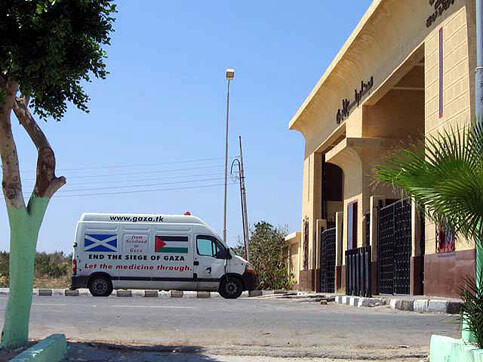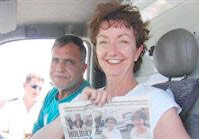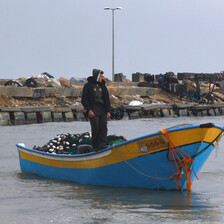The Electronic Intifada 29 July 2008

The van carrying supplies stopped at the Rafah crossing. (Eva Barlett)
Following the publication of this story, serious allegations of fraud and misconduct have been leveled at Mr. Khalil Alniss. The Electronic Intifada expresses no opinion about these allegations, but provides the link to the following news article for informational purposes and as an update to this story: “EXPOSED: The ‘missing money’ and chequered past of campaigner behind mercy mission to Gaza,” The Herald (Scotland), 1 November 2008.
Ten days after setting out from Edinburgh, and five days past their projected 15 July arrival, Scottish humanitarian Khalil al-Niss and his wife Linda Willis finally arrived in the afternoon of 20 July to the Rafah crossing on the Gaza-Egypt border only to be denied entry to Gaza.
The Gazan side, just over 100 meters from the Egyptian gate and Israeli-built wall, is visible from where the couple’s van sits idle; doctors inside Gaza wait for the expected delivery of essential medical aid.
Having arrived by ferry from Jordan after 11pm, al-Niss and Willis were made to wait over 24 hours at the border town of Nuweiba, where Egyptian authorities repeatedly sent them to six different departments to fill out form after form.
Once again, the van was unloaded as Egyptian officials inspected its contents to only reload them seemingly satisfied the couple really was bringing in vital medicines and equipment.
“Egyptian bureaucracy is amazing. We sat, had tea, filled out forms and were told, ‘okay, you’re ready to go now. Just go over to that office there and fill out one more form,’” Willis told Daily News Egypt.
Just after 1pm on 20 July they drove into al-Arish, the pair weary but pleased to have made it to their second-to-last destination. “We’re completely exhausted. Since Wednesday morning until now we’ve only slept a cumulative 10 hours,” said Willis.
Willis and al-Niss have driven day and night in a van crammed with urgently-needed medical supplies and equipment to reach northeastern Sinai town of Rafah on the Gaza border.
They are part of a growing trend of international citizens who have decided to help end the Israeli siege on Gaza where residents are denied the most basic necessities — including vital medicines and hospital equipment parts.
Willis, a native of Scotland and al-Niss, a Palestinian from Jerusalem living in Scotland, took time off from their jobs to deliver the medical supplies by first ferrying to Belgium, and then driving through Germany, Austria, and Slovenia.
Although the team anticipated difficulties crossing borders with a van decked out in the Palestinian and Scottish flags and filled with medicines, they hadn’t expected a flat-out denial of entry. Arriving at Croatia’s border, the pair was refused entry, causing them to backtrack and alter their route, driving instead through Romania, Hungary and Bulgaria to cross via Turkey two days later.
Turkish authorities also initially turned the van away, yet eventually relented some 17 hours later, having partially unloaded and searched the van’s contents, and permitting the van to pass. “I was surprised,” Willis explained, “because Turkey is a Muslim country and I had thought they would support and empathize with Gaza.”
Thankfully for the pair, travel was easier after Turkey.
“Syria was fantastic,” al-Niss said, praising the country’s aid in expediting travel through and on to Jordan. “Syrian authorities even provided us with a security convoy, all the way to the border.”
In Jordan, the duo once again faced excessive red tape and an unwillingness to allow them passage, a reticence which again surprised them given Jordan’s large population of Palestinian refugees. After again partially unloading the van, four hours later they were allowed to pass and boarded a ferry bound for Egypt.
Greater Obstacles

Khalil al-Niss and Linda Willis at the Rafah crossing. (Eva Bartlett)
“It’s just been such a long journey. It would be fantastic if we could enter and deliver the medicine, save some lives,” Willis explained. “But I don’t think it will be easy, I think we’ll need to get help from our Scottish Parliamentarians.”
Arriving at 2pm at Rafah’s closed gates, Willis and al-Niss were told they must first return to al-Arish to fill out border-crossing forms with officials based there before their crossing into Gaza would be considered.
The two, having been on the road for 10 days and already having faced days of bureaucracy and waiting, refused to leave the area, afraid that roadblocks might prevent their re-entry the following day. After a warning from Egyptian authorities that the area in front of the border was now a closed military area forbidden to foreigners, the couple relented, leaving the van parked at the border crossing, waiting to enter and deliver the goods.
Willis, a nurse in Scotland, explained the coordination with Gaza’s doctors:” We spoke with a doctor in one of Gaza’s hospitals. He’s desperate for the medicine and equipment we’re bringing. He’s particularly thrilled about the endotracheal tubes used in surgery that we are bringing as he says they are re-using the only tubes they have right now.”
The van also carries desperately-needed medication for heart conditions and diabetes, as well as syringes, bandages, swabs and antibiotics.
An Egyptian humanitarian who wished to withhold his name traveled to the border to support the Scottish effort condemned what he called the complicity of the Egyptian government in the siege. “Egypt shares in this crime,” he said. “The officers here denying you entry are taking orders from higher powers.”
Impact of siege
The Gaza-based Popular Committee Against the Siege (PCAS) last reported the number of victims who had died preventable deaths as a result of unattainable medical care under the siege as 212, the latest two victims including an 11-month-old infant and a 44-year-old father of eight. Both died after being denied permits to exit Gaza for treatment.
PCAS lists 107 classes of basic medicines that are depleted in Gaza, 97 more nearing depletion, 136 halted or not functioning medical instruments and over 1,500 patients who need to leave the Strip for medical treatment.
Despite the 19 June agreement to halt Israeli military operations, invasions, and indiscriminate shelling on Gaza, in return for an end to the launching of homemade rockets from Gaza towards Israel, Israel has not met its obligations in opening the borders with Gaza and allowing in adequate amounts of food, medical supplies, construction materials, fuel, and other vital elements denied to the civilian population for over one year.
Instead, the opening of Rafah, and the passage of goods into Gaza via other crossings, has been put on hold, used as a bargaining tool for the release of the Israeli solider being held in Gaza, even though his release was not part of the ceasefire agreement.
Willis and al-Niss remain hopeful that they will enter and bear witness, deliver aid and a message that the siege is inhumane, and if the international political community won’t do anything to end it, civilians will.
Their success may be echoed by the efforts of a team of over 50 internationals, including Israelis, who aim to reach Gaza’s coast by sea next month.
Holocaust survivor Hedy Epstein, an organizer of the Free Gaza Movement to break the siege by boat, hopes like Willis and al-Niss, to “remind the world that we will not stand by and watch 1.5 million people suffer [to] death by starvation and disease.”
Eva Bartlett is a Canadian human rights advocate and freelancer who spent eight months in 2007 living in West Bank communities. This article originally appeared in the Daily News Egypt and is republished with the author’s permission.
Related Links





